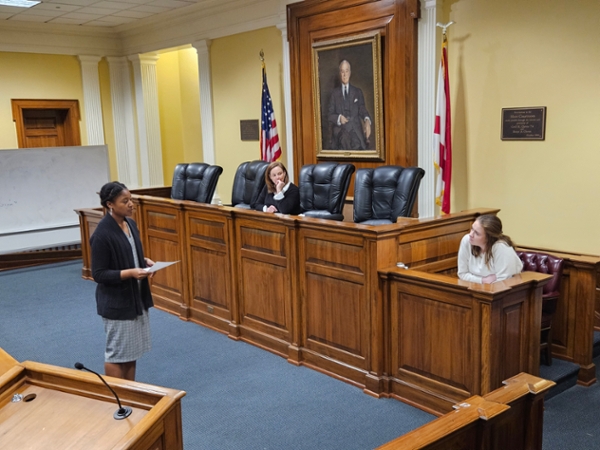Published on February 27, 2023 by Morgan Black, Frank Ruggiero

Interdisciplinary collaboration is just one hallmark of the Samford University educational experience. The most recent partnership occurred between Samford’s Cumberland School of Law and the School of Public Health’s Department of Social Work Feb. 16-17.
Two events, spearheaded by Lynn Hogewood, instructor and director of academic success in Cumberland School of Law, and Jean Roberson, assistant professor in the Department of Social Work, were held to demonstrate the intersection of law and social work.
This was the first time the two groups have come together for such partnership with the intention to create an opportunity for law and social work students to learn from each other.
First, a discussion introduced the Master of Social Work (M.S.W.) students to the legal system, their role in that system and how to be most effective in legal settings. A representative from Jefferson County children's mental health services shared about how social workers should best keep records and documents when it comes to family court.
Roberson said, “While this is key for forensic social workers, this is also critical for any social worker working in mental health and child welfare.”
Secondly, the two groups convened in the John L. Carroll Moot Courtroom for a demonstration of direct and cross examinations. Members of Cumberland School of Law’s Trial Advocacy Board and a few other law students served as advocates who worked in small groups with the social work students to develop and practice being called to testify in court.
Matt Woodham, assistant professor of law and interim director of advocacy, joined the simulation and shared his experience in criminal court and working with social workers in his practice. His experience and empathy resonated with the social work students.
Heaven Colquiett, a student in the Master of Social Work program, said she was excited to learn more about the court process. She said, “As a social work student, I benefited from the moot courtroom exercise because we don’t have any law classes as social work students. It was beneficial to act out the process because getting subpoenaed can be nerve-wracking in so many ways, but getting the opportunity to practice has better prepared us if this happens in the future.”
Colquiett also said she didn’t realize how important social workers could be in criminal law and cases.
“It was interesting to hear about another career opportunity that we can consider, and it reminded me yet again how versatile social work is,” she said. “I want to work in the federal government and work with veterans. My records could get subpoenaed, so this exercise would be very beneficial. Also, if they ever have any situations with the law, I could be another resource they could use, and knowing different legal terms could also be beneficial.”
Hogewood’s passion for teaching students expands beyond the walls of the law school. She said, “This collaboration between the law school and the M.S.W. program allowed me to share about the legal system and to witness law students sharpening their advocacy skills and taking it a step further to teach the M.S.W. students. I am so proud!”
Hogewood and Roberson hope to offer this experience every two years so that each M.S.W. student has the opportunity to learn more about working in legal settings.
Roberson said, “Our two professions work in the same space in family law. Our intent was to create an opportunity where each student could benefit from learning together and learning how to be more effective in our interprofessional collaborations for the good of our clients.”
Located in the Homewood suburb of Birmingham, Alabama, Samford is a leading Christian university offering undergraduate programs grounded in the liberal arts with an array of nationally recognized graduate and professional schools. Founded in 1841, Samford enrolls 6,324 students from 44 states, Puerto Rico and 16 countries in its 10 academic schools: arts, arts and sciences, business, divinity, education, health professions, law, nursing, pharmacy and public health. Samford is widely recognized as having one of the most beautiful campuses in America, featuring rolling hills, meticulously maintained grounds and Georgian-Colonial architecture. Samford fields 17 athletic teams that compete in the tradition-rich Southern Conference and boasts one of the highest scores in the nation for its 97% Graduation Success Rate among all NCAA Division I schools.
